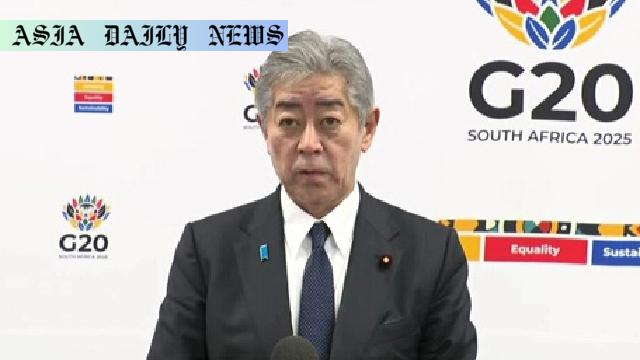Cooperation: Japan’s Foreign Minister urges the G20 to foster harmony and dialogue amidst growing global tensions.
Cooperation is critical to address global division and confrontation.
Japan’s FM Iwaya Takeshi calls on the G20 to foster unity and dialogue.
The G20’s responsibility includes supporting nations from the Global South.
Emphasis on turning global conflict into actionable harmony.

Japan’s Call for Enhanced Global Cooperation
In a divided global landscape, Japan’s Foreign Minister Iwaya Takeshi has made a clarion call for the G20 nations to step up and promote international unity. Speaking at the G20 Foreign Ministers’ Meeting in South Africa, Iwaya emphasized the critical necessity of fostering enhanced global cooperation. He highlighted the pressing challenge of division and confrontation, which continues to characterize global interactions, and posited that harmony can be achieved through deliberate dialogue and collaborative efforts.
Transforming Division into Harmony
Iwaya Takeshi underscored Japan’s mission to transform discord within the global community into harmony, a task he considers a collective responsibility of the G20. He noted that the initiative should not solely rest on developed nations but must include emerging economies and members of the Global South. Addressing both structural and ideological challenges, Iwaya believes in prioritizing constructive dialogues to identify solutions that resonate with diverse stakeholders.
The Importance of Dialogue for Conflict Resolution
Dialogue plays a pivotal role in conflict resolution and cooperation-building, according to Iwaya. By seeking common ground, G20 nations can reduce friction and address shared challenges such as climate change, economic inequality, and geopolitical strife. The Minister called for open communication channels and active listening in multilateral spaces to ensure diverse perspectives are considered and integrated into policymaking efforts.
The G20’s Role Beyond Economics
While the G20 is predominantly recognized for its economic focus, Iwaya’s address reminded delegates of its potential in broader geopolitical and social realms. As a platform bringing together major economies, it has a unique vantage point to inspire cooperative frameworks that extend beyond trade and finance. Japan’s renewed appeal to the G20 highlights the interconnected nature of global issues and reiterates the importance of a comprehensive, unified approach to resolve them.
Looking Ahead: Japan and the Future of G20 Missions
Iwaya Takeshi’s remarks echoed Japan’s longstanding tradition of promoting peace, partnership, and progress on international stages. He called on member nations to commit to actionable outcomes that strengthen the bonds between rising and established economies. The move is part of Japan’s broader diplomatic agenda aimed at forging equitable partnerships and addressing the evolving needs of a dynamic world order.
Addressing the Needs of the Global South
A critical part of Iwaya’s speech highlighted the inclusion of Global South nations in the G20’s vision. These often-underrepresented countries face unique challenges, and their voices must be amplified to ensure equitable decision-making processes. Iwaya argued that by including all stakeholders, the G20 can create policies that reflect the true diversity of global concerns, thereby building lasting trust and solidarity.
Final Thoughts
In conclusion, Iwaya’s call for global cooperation was both timely and necessary, addressing the conflicts and divides that characterize today’s international affairs. His vision of unity through dialogue, collaboration, and inclusive governance aligns with the goals that the G20 aims to achieve. As the international community looks to the future, Japan’s leadership underlines the importance of collective efforts in bridging gaps and fostering long-term harmony.
Commentary
The Significance of Japan’s Leadership in Global Cooperation
Japan’s advocacy for enhanced cooperation at the G20 Foreign Ministers’ Meeting is a timely reminder of the value of multilateral collaboration. In a world marked by division and discord, Foreign Minister Iwaya Takeshi’s call for unity reflects Japan’s commitment to playing an active role on the global stage. By emphasizing harmony and dialogue, Japan has positioned itself as a champion of diplomacy and inclusion at a time when such leadership is sorely needed.
The Role of the G20 in Bridging Global Divides
The G20’s unique composition of developed and emerging economies presents it with an unparalleled opportunity to address global challenges. Minister Iwaya’s statement about the importance of incorporating the Global South in decision-making processes is not only necessary but transformative. By committing to equitable representation and dialogue, the G20 can ensure that its policies reflect the diverse needs and priorities of its member nations while addressing critical issues like economic disparity and climate change.
A Collective Responsibility for Change
While Iwaya’s vision is laudable, it also underscores the significant responsibility that falls upon G20 nations. Only through collective commitment can these aspirations translate into concrete actions. As the world navigates an increasingly complex geopolitical landscape, the need for understanding and compromise has never been greater. Japan’s vision offers a path forward—one rooted in cooperation, mutual respect, and shared aspirations for a better and more harmonious global future.


